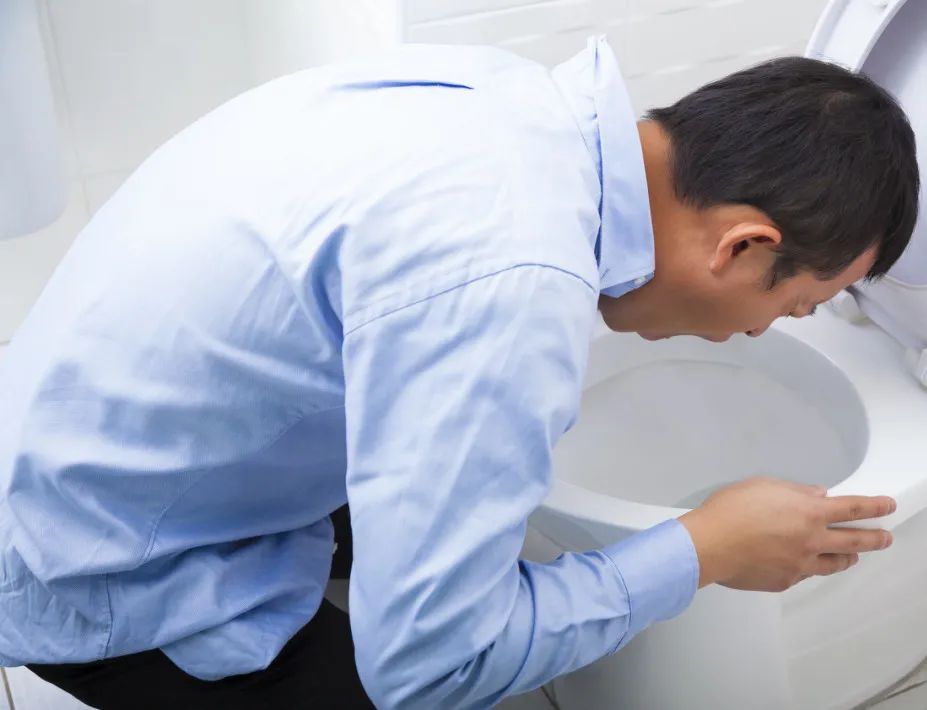The Olfactory Diagnosis in Traditional Chinese Medicine: Analysis of Vomit

Vomit originates from the stomach and is caused by the reversal of stomach qi. Under normal physiological conditions, the stomach functions by descending, allowing food and drink to be processed. If the stomach loses its harmony and descent, stomach qi will reverse, leading to the production of vomit. Therefore, vomit can reflect abnormalities in the descending and turbid aspects of stomach qi. Clinically, due to different pathogenic factors, the odor of vomit varies, and we can further assess the cold-heat and deficiency-excess patterns of diseases based on the smell of vomit.

① Fishy Odor
[Olfactory Diagnosis] The vomit is clear and thin with a fishy smell and no foul odor.
[Clinical Significance] This is caused by cold in the stomach, which can be further divided into deficiency and excess. Excess cold is often due to external invasion of wind-cold or overeating cold foods, where cold pathogens invade the stomach and intestines, causing qi to reverse and lead to vomiting. Vomiting may initially expel clear fluids, followed by the food consumed, and is often accompanied by external symptoms or severe pain in the stomach area. As stated in the “Treatise on Febrile Diseases: Differentiating the Pulses and Symptoms of Taiyang Disease,” Taiyang disease must have aversion to cold, body aches, and vomiting, indicating a blockage of qi in the upper jiao and excess in the exterior. The “Danxi’s Heart Method: Vomiting” states: “If cold qi is stagnant at the stomach entrance.” This also refers to vomiting caused by cold invading the stomach. The “Complete Book of Jingyue: Miscellaneous Diseases” suggests that most cases of vomiting are due to cold invading the stomach, with cold stomach cases being prevalent, while internal heat cases are rare, and external pathogenic vomiting is often due to cold evil; it identifies three patterns: one is from cold or cold-natured foods, another is from cold dampness invading the stomach, and the third is from external wind-cold, whether from febrile diseases or malaria, with the evil residing in the Shaoyang or Yangming channels. Deficiency cold is often due to insufficient stomach yang, which struggles to digest food and drink, leading to a failure in the stomach’s harmony and descent, resulting in vomiting. This is caused by spleen and stomach deficiency cold or spleen and stomach yang deficiency.
[Treatment Method] For excess cold, it is advisable to warm the stomach, disperse cold, and stop vomiting, using the formula Xuxiang Zhengqi San (Aromatic Qi Correcting Powder) with modifications; for deficiency cold, it is advisable to strengthen the spleen, warm yang, stop vomiting, or strengthen the spleen and warm the kidneys, stop vomiting, using Fuzheng Li Zhong Wan (Aconite and Ginseng Decoction) or Jin Kui Shen Qi Wan (Golden Cabinet Kidney Qi Pill) with modifications.

② Sour and Foul Odor
[Olfactory Diagnosis] The vomit is thick and turbid with a sour and foul smell.
[Clinical Significance] This is caused by heat in the stomach. It often results from excessive heat fermenting and corrupting food and drink, combined with the inflammatory nature of fire, leading to the reversal of stomach qi and the expulsion of foul vomit. As stated in the “Plain Questions: The Great Discussion on True Essentials,” “All sour vomit, sudden onset, and downward pressure belong to heat.” The “Complete Book of Jingyue: Miscellaneous Diseases” suggests that if there is fire evil in the middle jiao, it must be accompanied by fire symptoms, and the vomiting will be forceful, with a robust appearance, sound, and color; there may be mild or severe fire, or heat from summer affecting the stomach. The “Source of Miscellaneous Diseases: The Source of Vomiting” also states: “If food is violently vomited, the pulse is floating and surging, this indicates fire in the upper jiao; if there is lower obstruction and upper vomiting, it is also due to fire in the upper jiao; if there is heat in the lower jiao causing obstruction, qi reverses and leads to vomiting, this is called ‘running and feeding’;… if there is liver fire affecting the stomach; if there is excessive fire in the stomach itself;… if there is vomiting due to heat deficiency after a major illness…”
[Treatment Method] It is advisable to clear heat and stop vomiting, using Shi Gao Zhu Ru Tang (Gypsum and Bamboo Shavings Decoction) with modifications.

③ Sour and Rancid Odor
[Olfactory Diagnosis] The vomit is sour, rancid, and turbid, often mixed with undigested food residues (stale food).
[Clinical Significance] This is often caused by food stagnation in the stomach. It commonly results from overeating, damaging the spleen and stomach, leading to undigested food. Over time, it rots, resulting in sour and rancid vomit with whole grains. As pointed out in the “Source of Miscellaneous Diseases: The Source of Vomiting,” food stagnation in the stomach often leads to sour vomiting; if food causes pain in the heart area, which is intolerable, vomiting the food will relieve the pain, this condition is called ‘food obstruction.’ Whether due to cold evil invading the stomach, liver overacting on the spleen, or phlegm disturbing the spleen and stomach, all cases of vomiting food are classified as ‘food obstruction.’
[Treatment Method] It is advisable to eliminate food stagnation and assist in descending and stopping vomiting, using Bao He Wan (Preserve Harmony Pill) with modifications.

④ Fishy and Foul Odor
[Olfactory Diagnosis] The vomit has a fishy and foul smell, possibly mixed with pus and blood.
[Clinical Significance] This is often caused by stomach abscess. The “Introduction to Medicine” states: “Stomach pain due to dietary emotions and fire stagnation, further obstructed by external cold, causes the heat and turbid qi to fill the stomach.” The “Golden Mirror of Medicine: Essentials of Surgical Heart Method” suggests that if the stomach expels pus and blood, it is due to toxic food and emotional fire, leading to heat accumulation in the stomach and forming an abscess.
[Treatment Method] In the early stages, it is advisable to open the bowels and drain heat, promote blood circulation, using Da Huang Mu Dan Pi Tang (Rhubarb and Moutan Decoction) with modifications. If pus has formed, it is advisable to promote blood circulation and drain pus, using Chi Xiao Dou Yi Yi Ren Tang (Adzuki Bean and Coix Decoction) with modifications. After draining pus, it is advisable to tonify qi, using Buzhong Yiqi Tang (Tonify the Middle and Augment the Qi Decoction) with modifications.

⑤ Fecal Odor
[Olfactory Diagnosis] The vomit has a fecal odor.
[Clinical Significance] Vomit with a fecal odor suggests possible pyloric obstruction, peritonitis, or intestinal obstruction.
[Treatment Method] Treatment should be based on the specific clinical diagnosis and appropriate therapeutic methods and prescriptions should be selected.
In summary, vomiting caused by damp-heat or heat evil often presents with turbid and foul-smelling vomit, while vomiting caused by cold evil or cold dampness often presents with clear and thin vomit without a distinctive odor.

